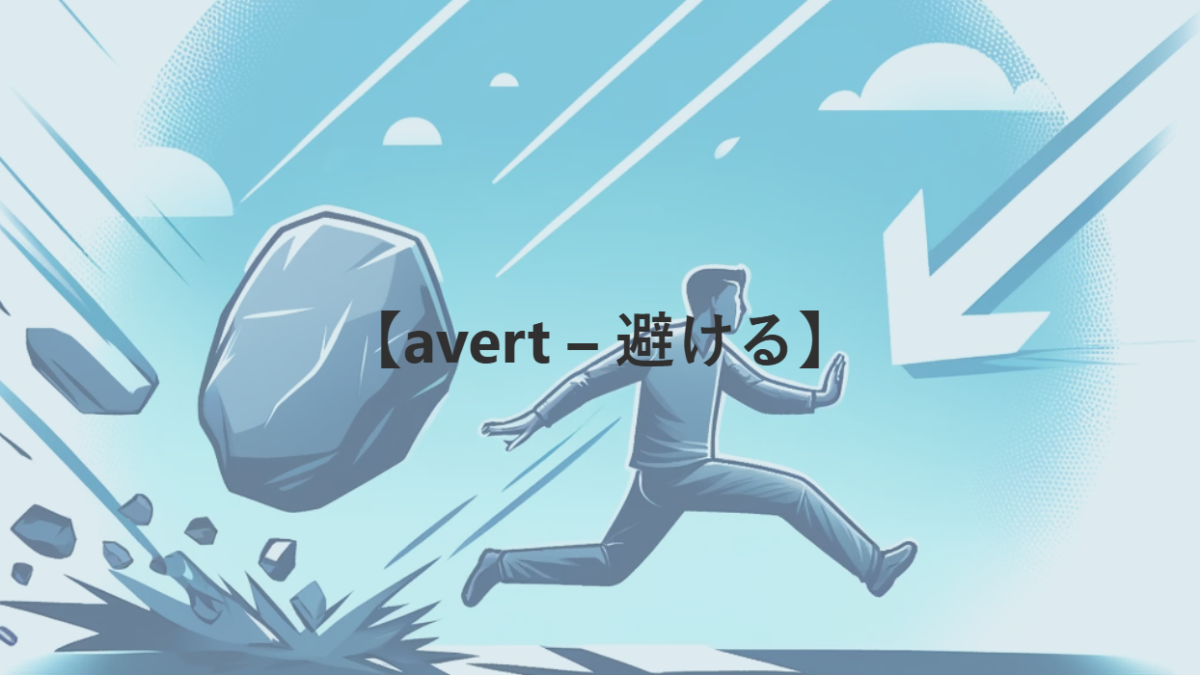語源・類義語・反対語・例文
【Avert – 避ける】という単語の語源とか由来を知っていますか?
「avert」という単語は、ラテン語の「avertĕre」から来ています。これは、「ab-」(「~から離れて」の意味)と「-vertere」(「回す」の意味)から成り立っています。したがって、元々の意味は、文字通りに何かから顔を背けること、または何かを避けることです。この用語は中英語に「averten」として取り入れられ、基本的な意味、つまり望ましくない何かから顔を背ける、または何か望ましくない事態を防ぐという意味を保持しています。何かを避けるという概念は、しばしば危険を避ける、否定的な結果を防ぐ、または望まない状況から目を背けるといった状況に関連付けられます。
The word “avert” comes from the Latin word “avertĕre,” which is composed of “ab-” meaning “away from” and “-vertere” meaning “to turn.” So, the original meaning is essentially to turn away from something or to turn aside. This term was adopted into Middle English as “averten,” and it has retained the basic meaning of turning away or preventing something undesirable from occurring. The concept of averting is often associated with avoiding danger, preventing a negative outcome, or turning away from an unwanted situation.
この単語の類義語・反対語を教えてください。
類義語:
- Avoid: 避ける
- Prevent: 防ぐ
- Dodge: かわす
- Evade: 回避する
- Sidestep: よける
反対語:
- Confront: 直面する
- Embrace: 受け入れる
- Face: 向き合う
- Accept: 受け入れる
- Attract: 引きつける
この単語に似た単語で間違いやすい単語はありますか?
- Advert: 「advert」は「注意を向ける」という意味の動詞や、広告を指す名詞ですが、「avert」とは全く異なる意味を持ちます。両者は発音が似ているため、混同されやすいです。
- Convert: 「convert」は「転換する」や「変える」という意味ですが、「avert」(避ける)とは異なります。これらの単語は動詞としての機能は似ていますが、意味の点で大きく異なります。
- Diverge: 「diverge」は「分岐する」や「逸れる」という意味です。方向性において「avert」と似ていることがありますが、主に道や意見が分かれる状況を指します。
- Averse: 「averse」は形容詞で、「~を嫌って」という意味があります。「avert」と音が似ていますが、「averse」は感情や傾向を示すのに対し、「avert」は実際に何かを避ける行動を意味します。
この単語を使った例文を5つほど教えてください。
She quickly averted her eyes when she saw something unpleasant.
(彼女は不快なものを見た時に素早く目をそらした。)
The timely intervention of the teacher helped avert a potential fight among the students.
(教師のタイムリーな介入により、生徒間の潜在的な喧嘩を回避することができた。)
They took immediate action to avert a financial crisis in the company.
(彼らは会社の財政危機を回避するために即座に行動を起こした。)
Wearing a seatbelt can help avert serious injuries in a car accident.
(シートベルトを着用することは、自動車事故における重傷を回避するのに役立つ。)
The negotiations between the two countries aim to avert a full-blown war.
(両国間の交渉は、全面戦争を回避することを目指している。)
【avert – 避ける】のコロケーション
- Avert a crisis: 「危機を避ける」。何か悪いことが起こるのを防ぐ、または回避することを意味します。企業や政府が大きな問題や困難を回避した場合によく使われます。
- Avert disaster: 「災害を避ける」。大規模な災害や不幸な出来事が発生するのを防ぐことを表します。事前の準備や迅速な対応によって、重大な被害が発生するのを防ぐことができる場合に使用されます。
- Avert one’s eyes/gaze: 「目をそらす」「視線を避ける」。何かを直接見たくない時や、不快または不適切なものから目を背ける場合に使われます。恥ずかしさや不快感を示すときによく用いられます。
- Avert a conflict: 「衝突を避ける」。人々や国家間の対立や争いを防ぐことを意味します。交渉やコミュニケーションによって、不和や衝突が起こるのを防ぐことを指します。
- Avert danger: 「危険を避ける」。身の危険やリスクが迫っている時に、それを回避する行動を取ることを表します。安全を確保するための予防措置や行動を指す場合が多いです。
「avert」という単語は、主に何か否定的な事態や望ましくない結果を回避する状況で使用されます。この言葉に関連する様々なコロケーションには、特定の文脈や状況が反映されています。
「Avert a crisis」では、企業や政府が大きな問題や困難な状況を回避する様子を表します。これは、潜在的な危機が実際に発生する前に適切な措置を取ることで、事態の悪化を防ぐことを意味します。
次に、「Avert disaster」は、大規模な災害や不幸な出来事を防ぐ行為を指します。事前の準備や迅速な行動により、深刻な被害や破壊を未然に防ぐことができます。
「Avert one’s eyes/gaze」は、個人が不快、不適切、または恥ずかしいものを見たくない時に使われる表現です。これは、視線をそらすことで、直接的な視覚的不快感から逃れる行動を示します。
「Avert a conflict」は、対立や争いを防ぐために使用されます。これは、交渉やコミュニケーションを通じて、人々や国家間の不和や衝突を未然に防ぐことを指します。
最後に、「Avert danger」は、危険やリスクが迫っている際にその危険を回避するための行動を意味します。この表現は、安全対策や予防措置をとることによって、安全を確保しようとする姿勢を示します。
これらのコロケーションを通じて、「avert」という単語がどのように使われるかが理解できます。主に、否定的な結果や望ましくない状況から身を守るための行動や措置を表すのに用いられます。
The term “avert” is primarily used in situations where negative events or undesirable outcomes are to be avoided. Various collocations associated with this word reflect specific contexts and circumstances.
“Avert a crisis” describes a scenario where corporations or governments avoid major issues or challenging situations. This implies taking appropriate measures before a potential crisis turns into an actual one, thereby preventing worsening conditions.
Next, “Avert disaster” points to the act of preventing large-scale catastrophes or unfortunate events. Through proper preparation and swift action, serious damage or destruction can be averted before it occurs.
“Avert one’s eyes/gaze” is an expression used when an individual does not want to see something unpleasant, inappropriate, or embarrassing. By diverting their gaze, they escape direct visual discomfort.
“Avert a conflict” is utilized to prevent disputes or fights. This refers to using negotiation or communication to prevent discord or clashes between people or nations before they arise.
Lastly, “Avert danger” signifies taking actions to evade imminent danger or risks. This expression shows an attitude of ensuring safety by adopting safety measures or preventative actions.
Through these collocations, we can understand how the word “avert” is used. It is predominantly employed to depict actions or measures taken to protect oneself from negative results or unwanted situations.
文法問題: “avert” (避ける)
- 動詞の形:
The quick action of the pilot _ a disaster.
(A) avert
(B) averted
(C) averting
(D) averts
解答と解説: (B) averted
空欄には動詞が必要です。文脈から過去時制が適切なので、averted (過去形) が正解です。
– - 目的語との組み合わせ:
The company took steps to _ a potential crisis.
(A) avert
(B) avert of
(C) avert for
(D) avert from
解答と解説: (A) avert
avert は他動詞で、目的語を直接取ります。前置詞は不要です。
– - 名詞形:
The _ of the crisis was due to the quick thinking of the emergency responders.
(A) avert
(B) averted
(C) averting
(D) aversion
解答と解説: (D) aversion
空欄には主語となる名詞が必要です。aversion は「嫌悪」「回避」という意味の名詞です。
– - 類義語:
The diplomat’s skillful negotiations helped to _ a war.
(A) avert
(B) prevent
(C) avoid
(D) all of the above
解答と解説: (D) all of the above
avert, prevent, avoid はいずれも「避ける」「防ぐ」という意味で、この文脈ではすべて適切です。
– - 誤文訂正:
The averting of the accident was a relief to everyone involved.
解答と解説: averting → aversion
空欄には主語となる名詞が必要です。averting は動名詞なので、名詞 aversion に修正する必要があります。

